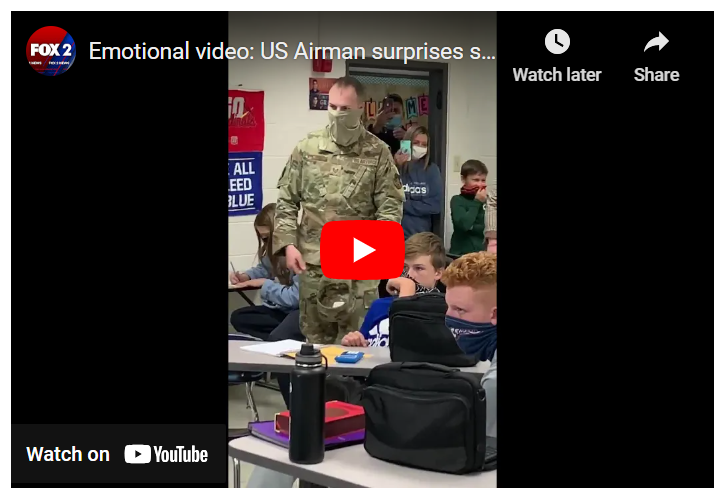Module 2 Topic 5
Knowing a student in your school is military-connected is the first step to offering support. You have heard military children are resilient. Resiliency doesn't come naturally—it is taught through the actions and words of those around us. For military children, resiliency is built by framing transitions as an experience to look forward to, being honest about transitions, and listening to and valuing a child's fears. It is important for adults in schools to be mindful of their impact on a child's resilience.
The Military Times published an article titled "How Schools Can Help Military Children in and out of the Classroom." The article contains many valuable suggestions and links to videos. Please take a few moments to read the article and view the videos.
Here are some additional suggestions to help ensure a welcoming school and classroom.
- Ask if families are connected to the military when they enroll. Ask about military service as part of your school's culture. Follow up by asking which branch the family is in and whether it is National Guard, Reserve, or separated. Remember, a student whose parent is within one year of separation still falls under the Compact. Consider posting one of the informational one-pagers and printing out brochures for parents.
- Focus on relationships. Take time to learn about where students have been and their hopes for their new location, and share what’s special about your school and community. Give military children opportunities to share where they’ve been and what they have experienced. Many military children have had amazing adventures — living abroad, completing monumental road trips, and experiencing our nation's diverse communities and world. Consider seating charts that allow military students to get to know new people without interjecting themselves into established peer groups. Try to avoid asking where they are from. This is the hardest question for a military child to answer. Instead, ask what their last location was.
- Make routines obvious and expectations clear. Each school has its own culture. Incoming military children have new rules, procedures, teachers, and classrooms to learn. Consider creating welcome packets that contain expectations, maps, etc.
- Look for academic gaps and help students find ways to close them. Attending a new school every 2-3 years puts students at risk for gaps in learning as curriculum pace varies from state to state and district to district. For example, School District A has students take US History in 12th grade, and School District B takes it in 11th grade. A military-connected student may leave School District A at the end of 11th grade (having not yet taken US History) and arrive in School District B, where students have already taken the course. Additionally, access to AP accelerated and other special programs may be impacted. Pre-assessments, communicating with school counselors, and following the Interstate Military Children's Compact are means to prepare military children for academic success.
- Be understanding. Understand when a student is absent again due to a parent's deployment. Know that Reservists maintain a full-time job in addition to serving and will be leaving their families each month. Recognize changes in a student's behavior and/or academic progress as deployments and relocations approach.
- Be inclusive. Like other demographic groups, military children want to see themselves represented in the books they are reading. Adding military-themed books to classroom libraries is one way to include military culture. A booklist can be found in the Resource section of the course.
- Celebrate transitions. Frame a military child leaving your classroom and school as a new experience waiting to be unlocked. Help them research their new location. Explore the food, the culture, and places they can visit. Thank them for being a part of your community. Validate their fears and sadness about leaving, but help the student see the positives in the experience that awaits.
Military-connected students also experience great joy when their parents return home. You may have seen videos of parents surprising children. Take a minute to watch a recent tearful reunion. (Please Click on the Picture below; you will be taken to another site)
Think
What steps can your school take to welcome and support military-connected children and families?
Additional Resources:
PSC Checklist for Military Kids Changing Schools.pdf
PTA Guide to Supporting Military Families.pdf
Books for Military-Connected Students
Successful Educational Transitions Poster.pdf
Identifier for Military Children in Education Data Systems .pdf
Our Military Kids Grants for Kids Activities










